Biographies of the Earlier Pioneer Brothers
Brother André Mottais
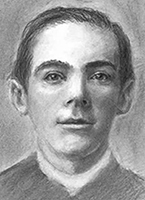
André Pierre Mottais was born in Larchamp, fifty miles northwest of Le Mans. The man who was destined to help create Holy Cross was one of four children. In 1820, he joined the newly founded Brothers of St. Joseph in Ruillé-sur-Loir. Appointed to serve the little group as novice master, spiritual director, and supervisor of instruction both in Ruillé and out in all the parish schools, André must have been disheartened at times by the rate of turnover among his young Brothers. In 1834 recognizing that the group of Brothers was disintegrating, André asked the bishop for help. When the Brothers were turned over to Basile Moreau, Andre moved up to Le Mans where the Brothers would be headquartered. We know little about André’s new life at Sainte-Croix. In 1840, he was sent as a missionary to Algeria but in 1842 returned to Sainte-Croix in broken health, a man near death. André died at Sainte-Croix at 8 PM on Saturday, March 16, 1844.
Brother Vincent Pieau
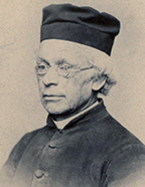
Brother Vincent was born Jean Pieau on February 15, 1797. He was orphaned early, and in 1822, at the age of 26, he traveled to Ruillé to join Dujarié’s young band of Brothers. He served as one of the four resident Brother-Directors of the Brothers of St. Joseph until he was sent to America in 1841, the oldest of the seven men sent from Le Mans to Indiana. He was chosen by Father Moreau because he could train the two missionary novices sent with the group, and he could train new recruits in Indiana. Vincent’s duties over the years were multiple: he was a factotum who could be used to fill any vacancy that arose at Notre Dame. Although he was the eldest of the seven Holy Cross men who came to America in 1841, Vincent outlived most of them. Death came to the patriarch Vincent on July 23, 1890, at the age of 93.
Brother Leonard Guittoger
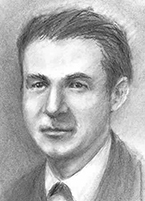
Leonard Guittoger was born at Terrehaut (Sarthe) on July 13, 1802, the year of Napoleon’s much needed and much welcomed Concordat. Three months after arriving at Ruillé in 1825, Leonard began his novitiate. As an administrator, Leonard was entrusted with significant responsibility. Within a few years of arriving, he was named one of the four Brother-Directors at Ruillé. He was instrumental in the transfer of the Brothers from Father Dujarie to Father Moreau, and in 1835, he went to visit and consult with the Christian Brothers at Plöermel. In the 1860’s, Leonard was accused of fomenting discord between the priests and brothers, agitating, in fact, to separate the two societies. He defended himself against the accusations, but the General Council punished Leonard by taking away his religious insignia, demoting him in rank to the bottom of all the professed, and forbidding him correspondence with any member except his superiors. He was not allowed to teach and served as a cook for one of the Brothers in a small village. He lived a quiet life thereafter until his death on June 9, 1877.
Brother Hilarion Ferton
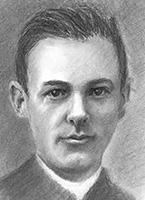
Six Brothers returned to Algeria in September 1844, two years and three months after their previous mission there. Their leader was Brother Hilarion Ferton, who had come to Le Mans from Calais to join the Brothers in 1837 at age 20. As the leader of the second expedition to Algeria, Hilarion was responsible for keeping his men in working order, a duty that included confrontation. At Oran, Hilarion ran into a tug-of-war between the pastor and the sub-director of public instruction over a house for himself and Brother Victor. Hilarion became caught up in a battle over the types of students who could be accepted at his school, but by July, Hilarion was able to report a favorable start at Oran. Hilarion was a virtuous man with solid principles, demonstrated throughout his correspondence with Moreau, whom he regarded as more than a religious superior. Sadly, Hilarion died of cholera at Oran on October 15, 1849. He was 32 years old.
Brother Rémi Mérianne
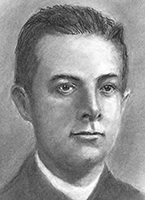
Brother Rémi was born Etienne Mérianne in La Quinte (Sarthe) February 10, 1809. He joined the Brothers in 1825. He was a master teacher, but we best remember him for the memoirs he wrote in old age at the request of the General Council, who wanted the elderly Brother to write down his recollections of the Congregation’s earliest days. These reminiscences are priceless. In them, he not only recalls people and dates, but he discusses the tension between the two societies in Holy Cross. He comes down firmly on the side of union. He died at Angers in 1888, having given all but the first fifteen years of his life to the Community. He was a healer.
Brother Gatian Monsimer
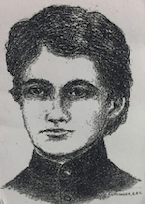
Bro. Gatian (Urbain) Monsimer was born April 3, 1826, on a farm in Mayenne, France. At the age of fourteen, in August of 1840, he was received into the Congregation of Holy Cross at Le Mans, France. One year later Father Basil Moreau chose him to be one of the six Brothers, with Fr. Edward Sorin as their superior, to found a mission in Vincennes, Indiana. In the United States, Brother Gatian learned English very quickly and within a few weeks began to teach in that language. In fact, Father Sorin thought so well of Brother's abilities that in 1849 he sent him to New York to investigate and report on difficulties that existed at a school conducted there by the Brothers. In 1850, Father Sorin was desperate for funds for Notre Dame and sent him along with three other Brothers and three laymen on an expedition to California to look for gold. This endeavor ended in failure, and Gatian left Holy Cross and continued mining in California. He eventually returned to France where died on his father’s farm where he had been 34 years before.
Brother Lawrence Ménage
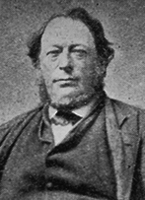
Born in France on March 12, 1815, Brother Lawrence entered the Congregation of Holy Cross in 1840. Two weeks after his first profession, Lawrence was on a ship to America with Father Sorin and five other brothers. A successful farmer in France, Lawrence used his farming skills in Indiana. A stout, burly, and imperturbable worker, he was well respected as a businessman and manager of the extensive fields at St. Joseph Farm of corn and wheat, herds of pigs and dairy cattle and orchards of peach and apple trees. At Father Sorin’s request, Lawrence was part of the group who ventured to California in search for gold, but he eventually returned to Indiana. When he died. Father Sorin said of him: "I've seen many men of fidelity, great zeal, and devotedness, but I remember none I would place above Brother Lawrence. I lost a friend who never refused me any sacrifice."
Brother Francis Xavier Patois
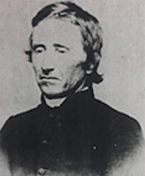
Brother Francis Xavier was born in Clermont, France, on July 27, 1820. He made his first profession of vows on August 22, 1841. Brother Francis Xavier was first called Brother Marie, which was afterward changed to Brother Francis Xavier. A devoted, faithful, and humble religious, Francis was both a carpenter and undertaker. In a circular letter, Father William Corby, recalled how Brother Francis Xavier “was frequently called up at midnight and had to go eight or even twelve miles to attend the dead. Hundreds of times he was exposed in rains, snow-storms; perched on an uncovered hearse, slowly making his way to the Church and cemetery.” Francis Xavier was the last surviving member of the original seven missionaries who came to Indiana. He died on November 12, 1896.
Brother Joachim André
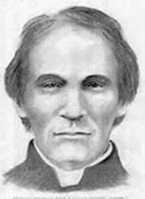
Twelve years younger than Brother Vincent, Brother Joachim André was the second oldest of the group to leave for North America. Unfortunately, not much is known about him. He professed his final vows only a few weeks prior to his departure from Le Mans to North America. His role was a tailor by trade and a cook by necessity. The housekeeper, who previously served meals to the parish, taught him “secrets of preparing American cuisine." He was in the second group that traveled to Notre Dame in February 1843. Unfortunately, he suffered "consumption" (tuberculosis) for many weeks, and died on June 9, 1844, the first Holy Cross pioneer to die in America. Brother Joachim is buried in the Community Cemetery.
Brother Anselm Caillot
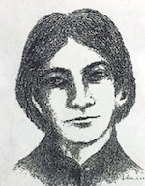
Pierre Caillot was born on March 19, 1825, in Gennes, France. Having entered the Brothers of St. Joseph at 14 years of age, he was given the name Anselm. Probably because of his facility for languages, Father Moreau sent him to America, where he taught at the Cathedral elementary school in Vincennes and lived in uncomfortable conditions. Being one of the few religious not living at Notre Dame, he, unfortunately, felt "divorced" from the rest of the community. Being young, Anselm longed for and needed the community life to which he had committed himself in Holy Cross. He eventually was assigned to teach in a school in Madison, in the southeast corner of Indiana on the Ohio River. He was very well-loved at the school and by the friendly pastor. One day, while swimming in the Ohio River, Anselm unknowingly ventured into a deep portion of the river and tragically drowned. The whole town attended the funeral of this beloved teacher. His grave remains in Madison.
Brother Stephen Gauffre
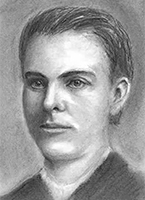
Etienne Gauffre was born in 1792 and was the fourth man to join the Brothers of St. Joseph. He was 28 years old. Br. Stephen epitomized the community mission in the schools, and he was known for his teaching skills. He earned a teaching license in May 1822, one of the few earlier brothers to do so. He taught for 12 years at Denis d’Orques, the first foundation of the brothers. Stephen was also instrumental in developing the fledgling congregation in its earlier stages. He persevered in his vocation until his death in 1853, two days shy of his fifty-ninth birthday.